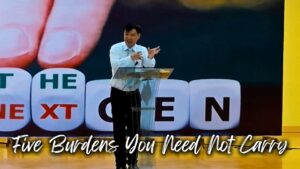WHEN THE RIGHTEOUS SUFFER
Job 1: 1- 22
1 There was a man in the land of Uz whose name was Job, and that man was blameless and upright, one who feared God and turned away from evil. 2 There were born to him seven sons and three daughters. 3 He possessed 7,000 sheep, 3,000 camels, 500 yoke of oxen, and 500 female donkeys, and very many servants, so that this man was the greatest of all the people of the east. 4 His sons used to go and hold a feast in the house of each one on his day, and they would send and invite their three sisters to eat and drink with them. 5 And when the days of the feast had run their course, Job would send and consecrate them, and he would rise early in the morning and offer burnt offerings according to the number of them all. For Job said, “It may be that my children have sinned, and cursed God in their hearts.” Thus Job did continually.
6 Now there was a day when the sons of God came to present themselves before the Lord, and Satan also came among them. 7 The Lord said to Satan, “From where have you come?” Satan answered the Lord and said, “From going to and fro on the earth, and from walking up and down on it.” 8 And the Lord said to Satan, “Have you considered my servant Job, that there is none like him on the earth, a blameless and upright man, who fears God and turns away from evil?” 9 Then Satan answered the Lord and said, “Does Job fear God for no reason? 10 Have you not put a hedge around him and his house and all that he has, on every side? You have blessed the work of his hands, and his possessions have increased in the land. 11 But stretch out your hand and touch all that he has, and he will curse you to your face.” 12 And the Lord said to Satan, “Behold, all that he has is in your hand. Only against him do not stretch out your hand.” So Satan went out from the presence of the Lord.
13 Now there was a day when his sons and daughters were eating and drinking wine in their oldest brother’s house, 14 and there came a messenger to Job and said, “The oxen were plowing and the donkeys feeding beside them, 15 and the Sabeans fell upon them and took them and struck down the servants with the edge of the sword, and I alone have escaped to tell you.” 16 While he was yet speaking, there came another and said, “The fire of God fell from heaven and burned up the sheep and the servants and consumed them, and I alone have escaped to tell you.” 17 While he was yet speaking, there came another and said, “The Chaldeans formed three groups and made a raid on the camels and took them and struck down the servants with the edge of the sword, and I alone have escaped to tell you.” 18 While he was yet speaking, there came another and said, “Your sons and daughters were eating and drinking wine in their oldest brother’s house, 19 and behold, a great wind came across the wilderness and struck the four corners of the house, and it fell upon the young people, and they are dead, and I alone have escaped to tell you.”
20 Then Job arose and tore his robe and shaved his head and fell on the ground and worshiped. 21 And he said, “Naked I came from my mother’s womb, and naked shall I return. The Lord gave, and the Lord has taken away; blessed be the name of the Lord.”
22 In all this Job did not sin or charge God with wrong.
How can a good God allow suffering to His children? Shouldn’t He be protecting them from such?
MAIN POINTS
- The Righteous Man – Job
- The Good God
- The Blessed Family
- The Trial of God
- The Righteous One In Our Suffering
I. THE RIGHTEOUS MAN – JOB
Who Was Job?
Job is a man whose faith was in a God who is worthy to be feared (Job 1:1). The prose begins with a simple statement about a man in the land of Uz. The geographic location of this land is not certain. Some suggest it is near the ancient city of Damascus which borders the desert. It may be identified with Abraham’s nephew who was named Uz (Genesis 22:21).
He was the man of unrivaled piety. “Job” means “the tried” or “repentant one. His righteous character is attested to not only by men, but by God.
What was Job like?
- “Blameless”
The Lord said of Job, “There is none like My servant Job on the earth, a blameless and upright man, one who fears God and shuns evil” (Job 1:8; 2:3). To be blameless is to be a man of integrity above reproach. It does not mean Job was sinless or morally perfect-this can only be assigned to Christ.
- “Upright”
To be upright is to walk with distinction, not diverting from the path set forth by God. Job was highly esteemed for his moral standards and commitment to the truth. He was determined to stay the course set before him without compromise.
- “God fearer”
Job had a legitimate awe and appropriate reverence for God that influenced every aspect of his life and values. He was not a casual worshipper. When he entered God’s presence in worship he said, “I am terrified at His presence; When I consider this, I am afraid of Him. For God made my heart weak, and the Almighty terrifies me” (Job 23:15-16).
This is a response completely repugnant and shunned by our generation. But this fear was the beginning of his wisdom. Proverbs 9:10, “The fear of the LORD is the beginning of wisdom and the knowledge of the Holy One is understanding.” The wise understand that they are fallen creatures and that God is their Creator and Redeemer.
But this wisdom comes only from a personal acquaintance with the Holy One, Jesus Christ. Therefore, men are not saved by their own wisdom, but by the wisdom that comes from above.
- “He shunned evil”
Because of his passion for God’s glory, he kept away from evil as much as possible and walked away from it when it came at him. Here was a godly man who treasured righteousness above all things.
II. THE GOOD GOD
Job’s God was gracious and benevolent (Job 1:2-3). God made Job prosperous beyond his greatest expectations (Job 2:10). He had a wife, seven sons and three daughters; the number of children numerically represents God’s number of complete provision. So Job’s children were the glory and joy of his life.
The Lord also completely provided possessions for Job as seen in the number ten again. The Lord blessed the work of his hands by giving him 7,000 sheep for food and clothing plus 3,000 camels for hauling merchandise. There were 500 yoke of oxen plus 500 donkeys for plowing and pulling carts.
Job believed that we are to accept adversity with the same gratitude that we accept prosperity. He reasoned that if God is sovereign and holy, then whatever He allows or designs to enter his life is for God’s glory and his good.
God made Job “The greatest of all the people of the East” (Job 1:3). In the days of his prime, God was good to Job’s tent. His wife and ten children surrounded him.
This was the day God appointed prosperity for Job. But that day was about to come to sudden stop.
We do not know what we will face in days ahead. God has ordained that this knowledge be hidden from us. That is why we are to live by faith.
Psalm 62:10 warns us: “If riches increase, do not set your heart on them.” Wealth, relationships, and health can be taken from us so quickly.
Ecclesiastes 7:14“In the day of prosperity be joyful, But in the day of adversity consider: Surely God has appointed the one as well as the other, so that man can find out nothing that will come after him.” Life is not to be mourned or squandered; rather it is to be enjoyed while time, resources, and health permit.
III. THE BLESSED FAMILY
Job is seen as a priest sacrificing to his Holy God.
Job 1:4-5 “His sons used to go and hold a feast in the house of each one on his day, and they would send and invite their three sisters to eat and drink with them. 5 And when the days of the feast had run their course, Job would send and consecrate them, and he would rise early in the morning and offer burnt offerings according to the number of them all. For Job said, ‘It may be that my children have sinned, and cursed God in their hearts.’ Thus Job did continually.”
A true measure of Job’s blessing was that of his family celebrating life together. They would invite all the family to come for these great events where every member of the family was significant and celebrated on their appointed day.
The family is a place to belong, a shelter in a time of storm, a museum of memories, a school of truth, and a sacred site for worship. And Job’s children perpetuated these spiritual and family values with which they had grown up.
When times come for the family celebrations, it provided an opportunity to pray for every child individually. Then he would sanctify or purify them in preparation to worship the Lord. He would cleanse them and anoint them with oil. Then he would offer burnt offerings that ascended up to the Lord.
Why did Job do this?
He feared that one of his family members might have offended a holy God. As the priest of his family, he wanted to intercede for his children when they sinned. But he also feared they may have cursed God in their hearts.
Job was greatly blessed by God, he had a godly family and we can see that the reason for his suffering was not because of his sinfulness. What is about to happen to Job is not caused by his own actions. But Job is not the only person on trial. In fact, we have another person who is put on trial.
IV. THE TRIAL OF GOD.
GOD IS PUT ON TRIAL.
Job 1: 9- 11“Then Satan answered the LORD and said, “Does Job fear God for no reason? Have you not put a hedge around him and his house and all that he has, on every side? You have blessed the work of his hands, and his possessions have increased in the land. But stretch out your hand and touch all that he has, and he will curse you to your face.”
Satan charges God with this problem:
- People only serve God selfishly.
- People only serve God because of what He does for them.
- Mortals only worship God out of self-interest.
“You have blessed the work of his hands, and his possessions have increased in the land.”
“Touch all that he has, and he will curse you to your face.”
Why do you serve God?
This becomes the life question for Job, the essence of the trial. It is also our life question and the essence of every trial we face. To put the question another way: Is it God himself that Job cherishes or is it the earthly pleasures that God gives that Job cherishes?
In a single day Job lost all of his wealth, all of his means for income, all of his servants, all of his animals, and all of his children. Everything has been completely wiped out by the hand of Satan.
Job is totally crushed. You can read this in verse 20: “Then Job arose and tore his robe and shaved his head.” But listen to what else he does. “Then Job arose and tore his robe and shaved his head and fell on the ground and worshiped.”(Job 1:20) He fell on the ground and worshiped God.
And he said, “Naked I came from my mother’s womb, and naked shall I return. The LORD gave, and the LORD has taken away; blessed be the name of the LORD.” (Job 1:21)
How can Job say this? How can Job go through all these things and still not sin or charge God with wrong, as verse 22 declares?
Further, Satan comes after Job a second time, declaring that mortals will give up anything to keep their lives and their health. But take his health away and Job will curse you to your face. So Satan wrecks Job’s health to such a degree that his friends did not recognize him and we are told that his suffering “was very great” (2:13).
What Job says must become life transforming for us if we are going to endure trials and handle them in the way that Job did.
This is the perspective of Job that we must adopt:We start with nothing. No one came into this world with anything. Every single one of us has absolutely nothing at the start. Therefore, everything we have is a gift and blessing from God that is completely undeserved.
The problem is that we start with all kinds of expectations for life. We pile up all of these expectations on life and then when something does not go the way we want, we curse God, get depressed, get angry, or leave the Lord altogether.
Everything we have is a gift of God that is completely undeserved. Everything in the middle is God’s gracious gifts. “Everything I am and everything I have is the gift of God. God does not owe me everything.”
When we rid ourselves of false expectations, recognize that we came with nothing and leave with nothing, and everything today is the gift of God, our whole life changes.
The question Satan poses: is it God that we love, or do we merely love what he does for us? Sad to say many people who think they are followers and lovers of God follow for what God does for them and not for who God is.
Eg. Job’s wife. Then his wife said to him, “Do you still hold fast your integrity? Curse God and die.”(Job 2:9) She says that there is no reason to serve God if you lose everything.
This is the challenge of Satan: Will mortals serve God if we lose it all? Will we still serve God if God was not the giver of every good gift in our lives?
V. THE RIGHTEOUS ONE IN OUR SUFFERING
Job was not sinless but considered blameless and upright because he feared God and turned away from evil. He was a prosperous man because God blessed him. He was a great man. He was blessed with possessions, riches and a good family. But a test came upon his life that he went through so much suffering. He lost everything except his life because God did not allow him to die. God spared his life. Because Job has proven himself to be righteous despite his suffering, God blessed him more towards the end of his life.
We need such kind of righteousness today. We need a righteousness like that of Job because that is God’s standard of righteousness. v22 “In all this Job did not sin or charge God with wrong.”
But who can live up to that standard?
There is only one person who lived and even surpassed the standard. He who has suffered and died when He was perfectly sinless. He was clothed with frail humanity.
Suffering is not a bliss but it is a consequence of the fall. It is the result of our sinful nature. For as long as we live we have to go through it but we have Someone who understands what we go through and what we will go through because he went through it. He is no other than Jesus.
Jesus is the Ultimate Job who suffered and even DIED on the cross. He took our suffering and bore it on his body. Whatever suffering we are going through, He went through it and he understands us. But He did not suffer so that we don’t have to face sufferings. He suffered to tell us that He is with us in our suffering.
We also have a high priest… Hebrews 4:14-15 – Seeing then that we have a great high priest, that is passed into the heavens, Jesus the Son of God, let us hold fast our profession. For we have not an high priest which cannot be touched with the feeling of our infirmities; but was in all points tempted like as we are, yet without sin.
Jesus our Great High Priest even offered an offering for us, just like Job, but He offered his own blood. He poured it on the cross so that even if we suffer, we have the assurance that God is in control of our suffering. That the enemy will not have the power to destroy our relationship with God despite our pain and suffering.
Therefore when we suffer, it is not to destroy us but to conform us into the image of His son. Just as Jesus suffered so we will but just as He overcame, we will also overcome. Just as He rose from the dead, we will also rise above suffering.
CONCLUSION:
If you say God is not fair to you because He allowed suffering to happen, look at the cross and you will see that God is more than fair. He is Gracious. Graciousness is far greater than fairness. Fairness is getting what you deserve but graciousness is receiving what you do not deserve.
Do you deserve to suffer? Yes, because of sin. That is fair. But God is gracious on the cross.




